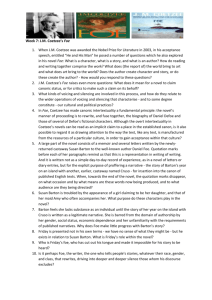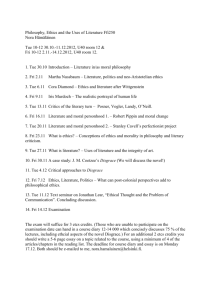DOC - Coetzee Collective
advertisement
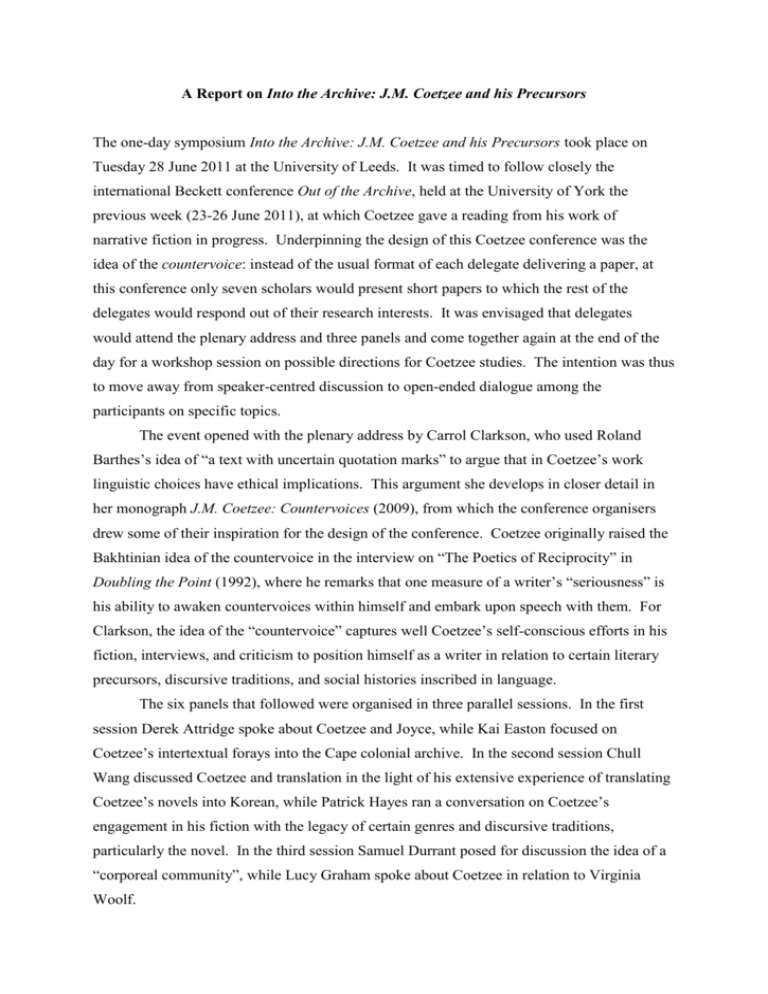
A Report on Into the Archive: J.M. Coetzee and his Precursors The one-day symposium Into the Archive: J.M. Coetzee and his Precursors took place on Tuesday 28 June 2011 at the University of Leeds. It was timed to follow closely the international Beckett conference Out of the Archive, held at the University of York the previous week (23-26 June 2011), at which Coetzee gave a reading from his work of narrative fiction in progress. Underpinning the design of this Coetzee conference was the idea of the countervoice: instead of the usual format of each delegate delivering a paper, at this conference only seven scholars would present short papers to which the rest of the delegates would respond out of their research interests. It was envisaged that delegates would attend the plenary address and three panels and come together again at the end of the day for a workshop session on possible directions for Coetzee studies. The intention was thus to move away from speaker-centred discussion to open-ended dialogue among the participants on specific topics. The event opened with the plenary address by Carrol Clarkson, who used Roland Barthes’s idea of “a text with uncertain quotation marks” to argue that in Coetzee’s work linguistic choices have ethical implications. This argument she develops in closer detail in her monograph J.M. Coetzee: Countervoices (2009), from which the conference organisers drew some of their inspiration for the design of the conference. Coetzee originally raised the Bakhtinian idea of the countervoice in the interview on “The Poetics of Reciprocity” in Doubling the Point (1992), where he remarks that one measure of a writer’s “seriousness” is his ability to awaken countervoices within himself and embark upon speech with them. For Clarkson, the idea of the “countervoice” captures well Coetzee’s self-conscious efforts in his fiction, interviews, and criticism to position himself as a writer in relation to certain literary precursors, discursive traditions, and social histories inscribed in language. The six panels that followed were organised in three parallel sessions. In the first session Derek Attridge spoke about Coetzee and Joyce, while Kai Easton focused on Coetzee’s intertextual forays into the Cape colonial archive. In the second session Chull Wang discussed Coetzee and translation in the light of his extensive experience of translating Coetzee’s novels into Korean, while Patrick Hayes ran a conversation on Coetzee’s engagement in his fiction with the legacy of certain genres and discursive traditions, particularly the novel. In the third session Samuel Durrant posed for discussion the idea of a “corporeal community”, while Lucy Graham spoke about Coetzee in relation to Virginia Woolf. In the closing event of the conference, delegates shared their thoughts on the burgeoning state of Coetzee scholarship and the questions this raises – whether there is an appropriate form of response to Coetzee’s fiction, whether scholars writing on Coetzee constitute an “industry” or a “community”, the risks of canonisation, the need for greater interdisciplinarity in Coetzee criticism, Coetzee and bibliotherapy. The question of an annual Coetzee publication was raised: while it was agreed that it is only a matter of time before such a journal is created, whether in print format or online, it was suggested that at this point an annual newsletter might be more useful, particularly in broadening the contact among Coetzee scholars to non-Anglophone countries. In this connection Carrol Clarkson spoke about the Coetzee Collective at the University of Cape Town as a valuable existing forum and network for postgraduates and established scholars to meet and present their research relating to Coetzee. In response to the suggestion that Coetzee scholarship in its present enthusiastic state risks making Coetzee a too reverent object of study, Clarkson reminded everyone of the mixture of levity and seriousness in the tone with which the first meeting of the Coetzee Collective was advertised in 2006: “Here goes. Calling all Coetzee soldiers. Attendance compulsory. Threatening and non-supportive environment.” It was emphasised too that the self-generating energy of an un-institutionalised initiative like the Coetzee Collective provides a valuable platform for attracting the funding required to run an annual publication of whatever kind in the field of Coetzee studies. Donald Powers
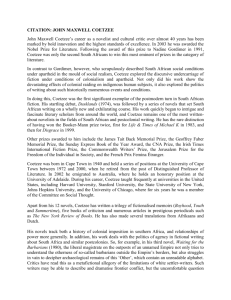
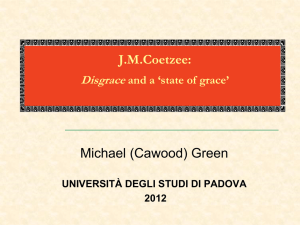
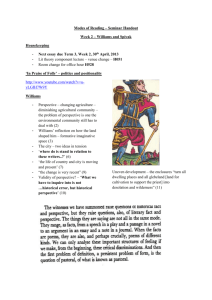

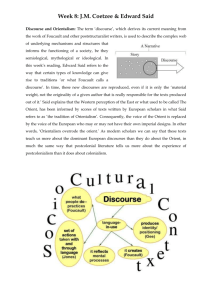

![Special Author: J M Coezee [DOCX 16.46KB]](http://s3.studylib.net/store/data/006725603_1-a90a37b51f13fcb8d2c12633d4a21525-300x300.png)
